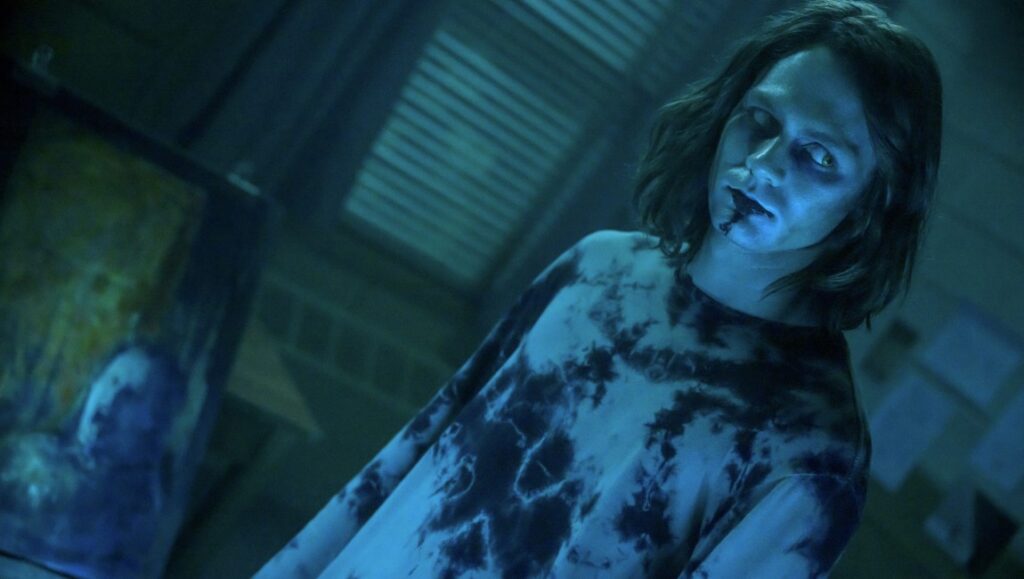Insidious: The Red Door marks the fifth film in the 13-year-old horror series, but it’s the first direct sequel to 2013’s Chapter 2, with parts three and four acting as prequels that followed the ghost-hunting antics of a trio of demonologists headed by Lin Shaye, all of whom appeared in supporting roles in the first two entries. As a refresher to this universe, those first films focused on the Lambert clan, a family of five headed by Josh (Patrick Wilson) and Renai (Rose Byrne). After their young son Dalton (Ty Simkins) suffered a blow to the head following a nasty fall, he started seeing demons in his comatose state, and those demons proceeded to follow him into his waking life, attacking family members at will. It was soon determined that Dalton could astral project, meaning his body could remain in one reality while his spirit, soul, etc., roamed a place known as The Further, which was inhabited by evil spirits desperate to taste life once more. As it turns out, dad Josh also possessed the ability to astral project, and he ultimately ventured into The Further to save his son. The sequel then involved Josh getting possessed by the spirit of a serial killer and attempting to murder his family, but he was naturally saved at the last moment, and he and Renai decided to have both his and Dalton’s memories wiped of the traumatic incidents through hypnosis.
Devoting half of this review to recounting the events of previous entries may seem like a dose of valium, but it’s both essential to The Red Door’s plot and helps stall a bit before digging into the wasteland of entertainment that is this final Insidious entry, far and away the worst chapter in the series and a contender for worst film of the year, so enervating is the final product. The film picks up nine years after the events of number two. Josh and Renai are now divorced, and Dalton is headed to art school halfway across the country. Father and son have a rocky relationship, with the young man accusing his father of not wanting to be a part of his life. As Josh explains it, “I feel like I’ve been in a fog, sorry,” so the Dad of the Year awards should be coming in by the truckloads at any moment. A tension-filled car trip gives way to a blow-out that results in Josh running away in tears, and Dalton channeling his rage into his art, which impresses his snooty art professor, even as a breathing exercise she enacts inadvertently leads Dalton to remembering his past. Cue his astral projecting, while Josh deals with his own demons, both literal and figurative, as memories of his absentee father are dredged up.
The first two Insidious films were average thrill rides elevated by the assured hand of director James Wan, a top-tier genre filmmaker who knows how to effectively build scares through sheer craftsmanship and cinematic know-how. Series star Wilson tags in for Wan this time around, marking his directorial debut, and while there are a few effective moments of tension throughout — one involving an MRI machine is the stand-out — they are always undermined by the fact that Wilson can’t stick the landing, resulting in a bunch of clichéd jump scares that fail to generate the sustained unease necessary for the material to work — a feat Wan achieved with aplomb. The pacing in The Red Door is especially glacial, with nothing of much interest or dramatic incident ever happening. A more generous take might qualify the film as “deliberately paced” or a “slow burn,” but sometimes a spade is just a boring spade. It’s never a good sign when countless scenes could be excised from the final cut with absolutely no difference made to the outcome. Had enough been done to keep the undeniably flat material entertaining even in spurts, or, you know, scary, more could be forgiven, but there’s simply no reason why Wilson and screenwriter Scott Teems — Leigh Whannell, series creator and writer of the first two entries, has likewise tapped out here — have to devote such a large chunk trading in low-hanging fruit, like sending up frat boy clichés. There’s also a memory game Josh plays involving overturned cards that features too prominently throughout — a game, it’s worth noting, at which Josh is so comically bad that it makes the viewer wonder if all the possession has given him brain damage.
It also takes forever for The Red Door to introduce its thematic destination, the underwhelming endpoint being — wait for it — generational trauma! Luckily, the film quite overtly explicates its themes because apparently everyone involved assumed the viewing audience would be made up entirely of worm-brains, with Dalton literally saying out loud, “We need to remember… even the things that hurt.” (*Proceeds to look up Teems’ past screenplays*: Halloween Kills and 2022’s Firestarter remake. Got it.) Byrne pops up for only a few scenes, undoubtedly as a favor to Wilson, and operates on the level of “can’t be bothered,” while Simkins at least acquits himself well enough considering the circumstances. There’s actually something appealing in seeing this group of actors reunite a decade later, the wear of time made stark due to the use of countless flashbacks, but nostalgia-baiting has become such an exasperating staple in the present cinematic landscape that even that small intrigue is tainted. Come film’s end, Wilson all but slams the door on a possible future entry in the series, which is for the best after this disaster of a finale — the climax of which is, no joke, the lyrics of a Rolling Stone song made literal. The Red Door is the kind of perfunctory, late-franchise sludge where creativity and entertainment go to die. Let’s hope Wilson turned the lock on his way out.
Published as part of InRO Weekly — Volume 1, Issue 27


Comments are closed.